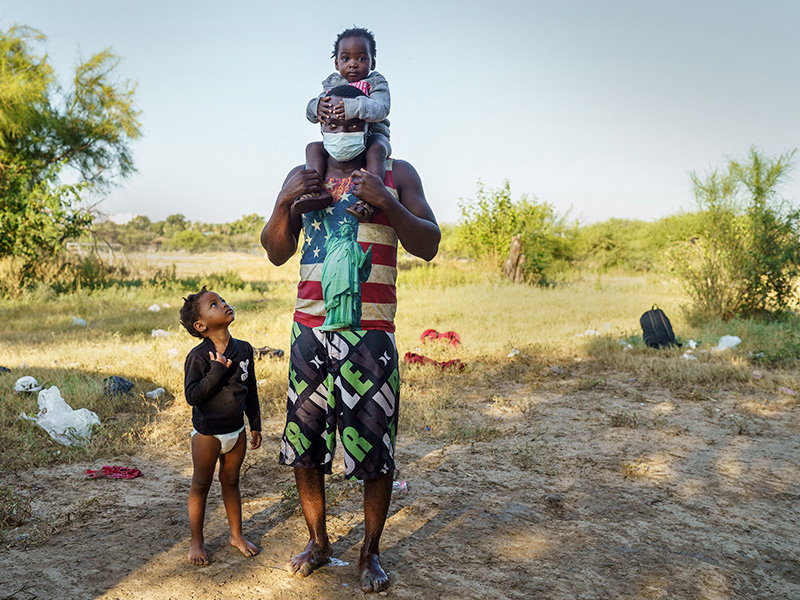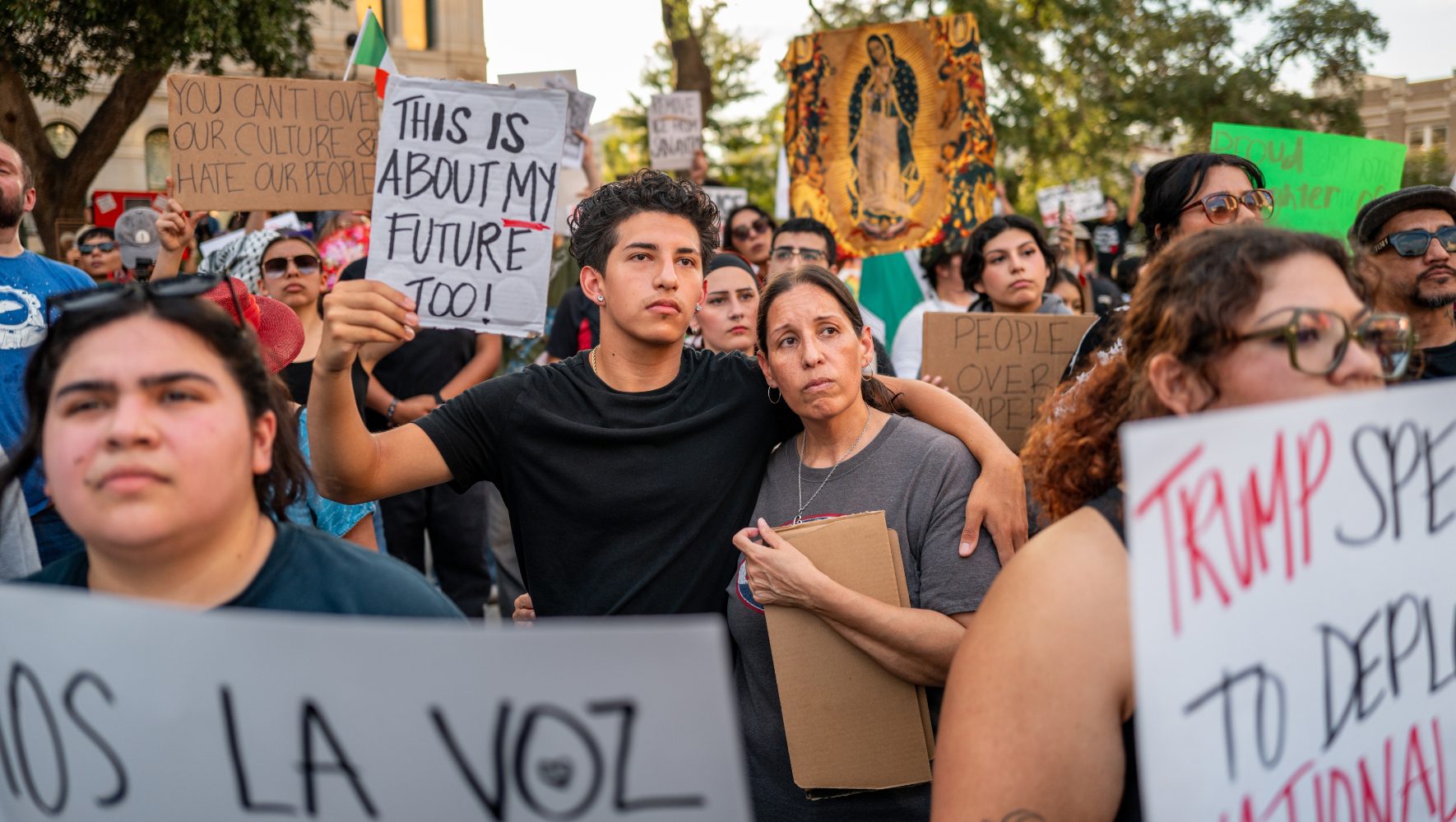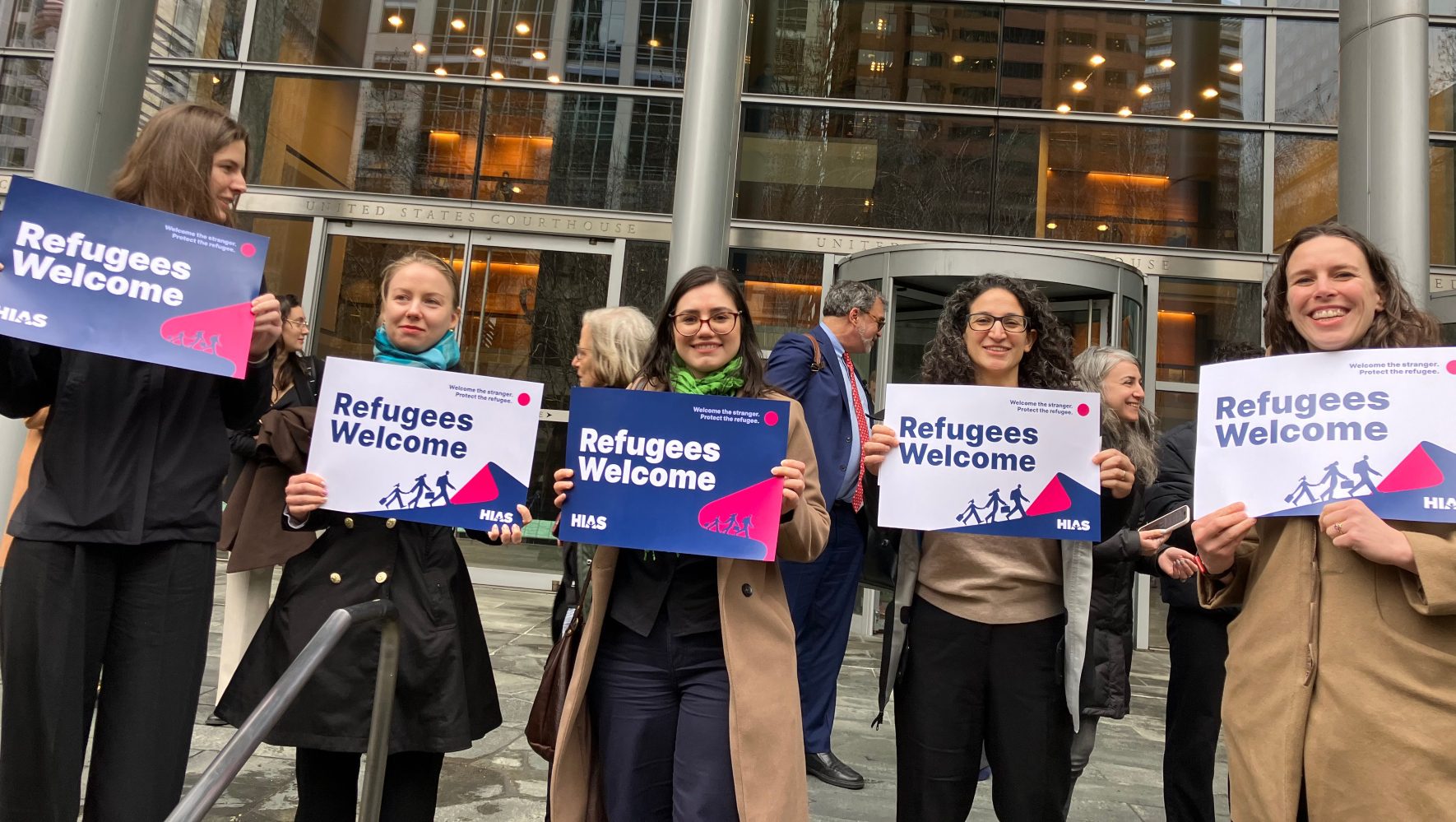Title 42: Over a Million Expulsions and No End in Sight
By Dan Friedman
Sep 23, 2021

A Haitian man holds his daughter on his shoulders as another child looks on, after they crossed the U.S.-Mexico border, abandoning their goal of entering the United States in Ciudad Acuna, Coahuila state, Mexico, September 20, 2021.
(Paul Ratje/AFP/Getty Images)
When the Biden administration reached out to HIAS in the spring of 2021 to ask if it would help people most in need of asylum at the U.S. Southern border, the organization was faced with a quandary. On the one hand working with vulnerable asylum seekers is a core HIAS mission, on the other hand those people only needed special intervention because President Biden had not followed through on his campaign promise to “[r]eassert America’s commitment to asylum-seekers and refugees.”
Title 42 is the law that has largely closed America’s borders to refugees and asylum seekers. When the pandemic hit, Trump administration officials invoked the obscure 75-year-old public health law that, they claimed, gave immigration authorities the power to summarily expel migrants on health grounds without providing them their legally mandated opportunity to seek protection in the United States.
But on September 16, Judge Emmet Sullivan of the U.S. District Court for the District of Columbia ruled that the law is being misused. Writing that the expulsion of asylum seekers denies them the "opportunity to seek humanitarian benefits" he ordered the Biden administration to stop turning away families. His judgment does not permanently invalidate the law, nor does it apply to single adults.
“We welcome the Judge’s opinion. Title 42 violates our domestic law and international obligations, but even more, it violates our values as a nation,” said Andrew Geibel, policy counsel for HIAS. “People expelled from the U.S. under Title 42 don’t get any chance to ask for asylum and instead they are sent into danger. We should never push someone away who is asking for our protection.”
Sending asylum seekers back to countries where they may face harm expressly contravenes the human rights principle of non-refoulement as well as U.S. immigration law. Especially for single adults who could be fleeing LGBTQ attacks or who could be pioneers for families that could not make the journey together, it denies people fleeing violence and persecution access to due process that is their fundamental human right. For example, the Haitians being deported en masse from the Del Rio crossing will be summarily returned to an island suffering from natural disasters and torn by political crisis without the chance to request asylum.
Candidate Biden promised to repeal "Trump's detrimental asylum policies,” as soon as he was elected but, despite the exceptions President Biden (unaccompanied minors) and Judge Sullivan (families) have made to Title 42, the promise has not been fulfilled. Indeed, the Biden administration has filed notice to appeal the Sullivan decision and reasoning, leading 71 organizations to write a formal letter of protest to the president, Secretary Mayorkas and Attorney General Merrick Garland.
So, the April request caused a dilemma which is still reverberating through HIAS: Should it help those worst hit by this edict or should it put pressure on the government to change its policy? Was there a way to do both?
At that moment, HIAS, the International Rescue Committee, and a couple of other organizations took the view that they could do both. They continued to advocate against the law, but agreed to a three-month implementation of a “consortium” protocol by which especially sensitive refugees could be specifically referred and processed for entry to the U.S. at six Mexican locations along the border — five of them run by HIAS.
At the same time, the ACLU negotiated a settlement with the government that would allow 250 asylum seekers to be allowed across the entire border each day. In exchange, the ACLU would set aside the Huisha-Huisha v. Gaynor case it had brought to challenge “the Trump administration’s policy of expelling refugees without any of the protections required by the immigration laws, on the ground that they might have Covid-19 infections.”
Both the “Huisha-Huisha” and “consortium” agreements were intended to lapse on July 31 when, it was widely-reported, Title 42 would be rescinded. When July 31 came and went without any statement from the White House, both IRC and HIAS announced that they would exit their agreement and the ACLU reinstituted their suit. HIAS formally withdrew at the end of August — using the remaining weeks to clear the backlog of applicants that it had already accepted.
“The effects of Title 42 have been disastrous,” said Sue Kenney-Pfalzer, HIAS Director of Border & Asylum Network. “It has led to over a million expulsions at U.S. borders over the last 18 months.”
Under Title 42, border agents forcibly remove people from the U.S. before they can exercise their legal right to claim asylum. As Physicians for Human Rights note, these people are at risk of kidnapping, sexual assault, torture, and murder and, earlier in the year, Human Rights Watch collected data on these crimes. Expulsions send many asylum seekers right back to the dangers they were trying to escape.
“Title 42 also results in increased family separation, as desperate families make the heartbreaking decision to send their children ahead to cross the border alone, knowing that at least they will be allowed to stay in the U.S.,” added Kenney-Pfalzer.
In recent months things have become worse as certain Mexican state governments refuse to accept expellees. For example, the Tamaulipas state government at one point stopped allowing families with children under the age of 6 back into Mexico. Although some families are released into the U.S. and given court dates, many of those picked up in the Rio Grande Valley are put on planes and flown to Mexican cities far from where they crossed the border.
After having officially stopped them, the administration has said that they are resuming these “lateral flights.” Officials are aware that these flights and other situations cause problems and have touted a raft of new tactics for the Mexico-U.S. border, including doubling the number of agents processing migrant arrivals. Still, Title 42 remains in effect. And, as Human Rights Watch points out, “Title 42 expulsions single out asylum seekers crossing into the United States at land borders—who are disproportionately Black, Indigenous, and Latino” and, as Buzzfeed recently reported, LGBTQ people are particularly vulnerable.
The refusal to offer due process means that asylum seekers are often held in crowded detention centers where masking, testing, social distancing and vaccination are inadequate. As AZCentral and The New York Times have pointed out over months, this means detainees are at high risk for infection by Covid. Those who are healthy but subjected to lateral flights are expelled in unfamiliar cities with no support network, often, noted Kenney-Pfalzer, “wearing detention camp-issued clothing that marks them as easy targets.”
The Biden administration now says it will re-evaluate Title 42 every 60 days, but could extend the order indefinitely, continuing to harm asylum seekers. Between every reevaluation tens of thousands of displaced people are being put in harm’s way. That’s why HIAS continues to call for the immediate ending of Title 42.



